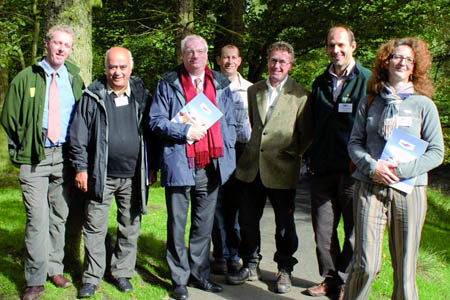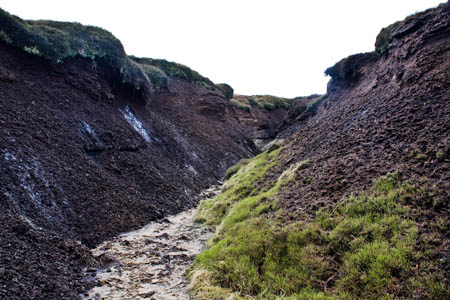They are the source of drinking water for millions of inhabitants of northern towns and cities, but the Peak District moors can also deliver devastating floods when torrential rain pours off the peat uplands.
Now, researchers and workers are investigating ways of making the moors work to prevent floods with a pilot project on the national park’s highest peak.
The Making Space for Water scheme involves researchers from Manchester University’s upland environments research unit re-vegetating the degraded moorland to slow water flow. The project is being run in partnership with the Environment Agency.
The team will work on an 89ha (220 acre) site on the Kinder Scout plateau, one of the most degraded areas of the Peak District, and one well known to walkers, including those setting out on the Pennine Way, for its inhospitable terrain and weather.
Lord Smith, chairman of the Environment Agency, helped launch the project beside Severn Trent Water’s reservoirs in the Derwent Valley, where restoration work in the upper reaches could also help reduce the impact of flooding downstream as far away as Matlock and Derby.

Lord Smith (third from left) chair of the Environment Agency, at the launch of the Making Space for Water project in the Derwent Valley, with partners from Natural England, the Peak District National Park Authority, Moors for the Future and the National Trust.
Lord Smith – former Labour secretary of state and a keen walker and munroist – said: “The moors play an important natural role in reducing the risk of flooding. They absorb, retain and slowly release rain or floodwater, easing river water levels at critical times. Protecting moors through schemes like this could ensure they continue to help manage flood risk, as climate change is likely to bring more intense rainfall and resulting floods.”
Work will include blocking some of the groughs – the deep gullies in the peat where excess rainwater quickly runs off the plateau into local rivers, as well as re-establishing moorland plants that absorb moisture and carbon, which is hoped to help tackle climate change.
Moorland erosion has been caused by wild fires, acid rain pollution from nearby cities, the harsh upland climate, over-grazing and visitor pressure. It means that soil both blows away in the wind, and seeps away as sediment into streams, rivers and reservoirs.
The Department for the Environment, Food and Rural Affairs, the Environment Agency, Natural England, the National Trust, Peak District National Park Authority and the Moors for the Future Partnership are all involved in the project.
Making Space for Water is one of three similar pilot projects nationwide to receive a total of £1m Defra funding; the others are Slowing the Flow in North Yorkshire, and Source to Sea in Somerset.
